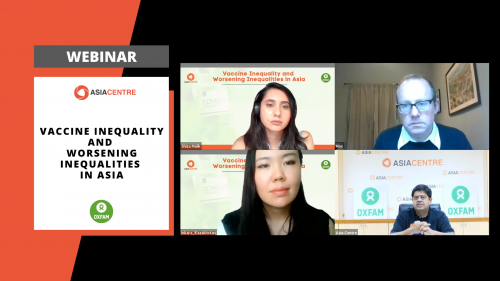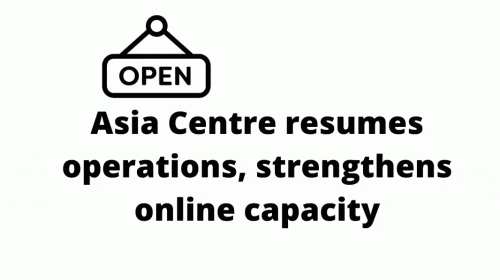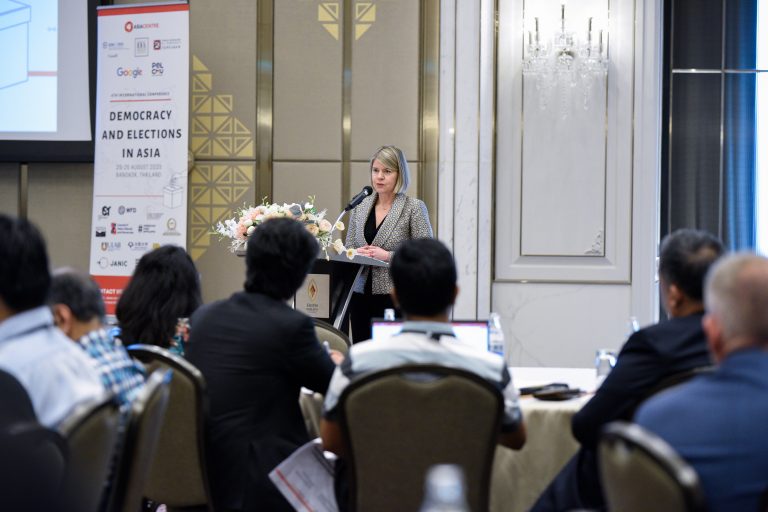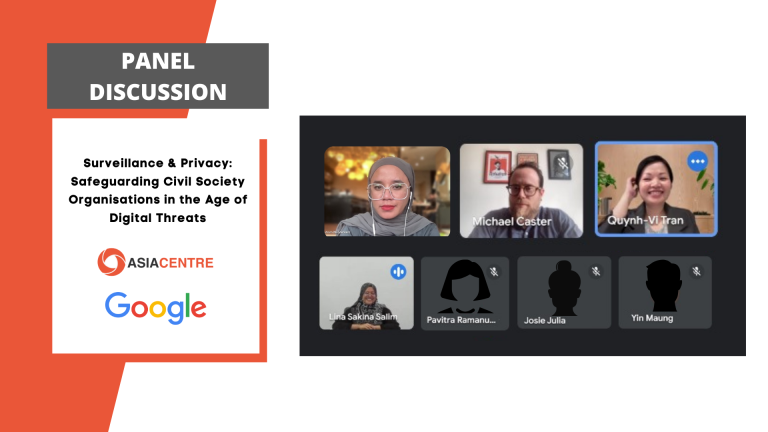
CSOs in the region are confronting significant surveillance and privacy threats, but there are actionable steps they can take to mitigate these risks. This consensus emerged from the Asia Centre’s event on 18 July 2024, titled “Surveillance & Privacy: Safeguarding CSOs in the Age of Digital Threats”.
32 attendees, including CSOs from across the region joined the event which was part of the Digital Rights Programme for Civil Society Organisations, jointly organised by Asia Centre and Google Asia Pacific. Commencing in December 2023, the year-long Digital Rights Programme includes thematic online and onsite activities aimed at bringing CSOs together to address pertinent digital rights issues.
During the event, six speakers highlighted current surveillance and privacy threats faced by CSOs and individuals in the region, the role of technology companies in perpetuating and preventing these threats, and how CSOs and individuals can take steps to protect themselves.
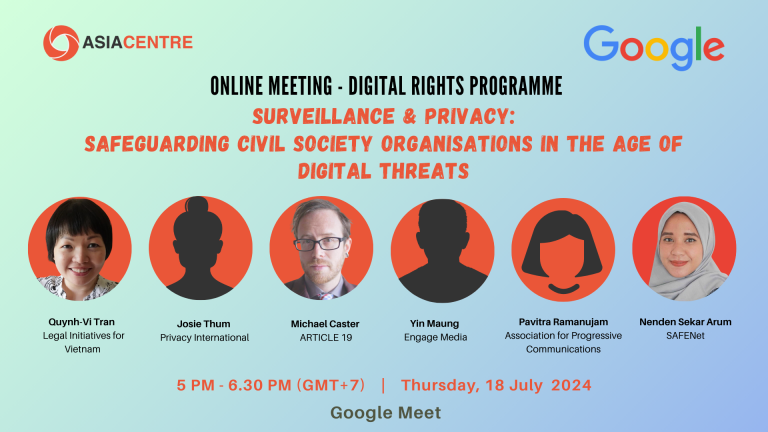
The panel discussion featured Pavitra Ramanujam from the Association for Progressive Communications, Josie Tham from Privacy International, Quynh-Vi Tran from Legal Initiatives for Vietnam, Yin Maung from Engage Media, Nenden Sekar Arum from SAFENet, and Michael Caster from ARTICLE 19. Lina Sakin Salim from Asia Centre moderated the session.
Pavitra Ramanujam, who leads the Digital Rights Work in Asia programme for the Association for Progressive Communications (APC), noted there was an increase in State and non-State actors maliciously targeting CSOs in the region. As the online space becomes more used by CSOs in their campaigns, governments have correspondingly responded by undertaking digital surveillance of communications such as phone calls, messages, or emails. Pavitra highlighted state-sponsored hacking activities, including the use of software like Pegasus for spying, and the issuing of takedown notices to social media platforms for certain content. She also noted instances of digital harassment and doxxing by non-state actors such as political, corporate, or religious groups targeting CSO-affiliated individuals.
Josie Tham, an Advocacy Officer at Privacy International, discussed Social Media Intelligence (SOCMINT), a form of surveillance where law enforcement and intelligence agencies collect and analyse social media data to identify potential threats. This includes accessing search histories, monitoring participation in online groups, reviewing user-posted content, and extracting data from social media pages. Josie highlighted the impact of SOCMINT on human rights such as privacy, freedom of expression, and public participation, and suggested strategies to mitigate SOCMINT collection, such as removing EXIF data from published images and disabling location access permissions.
Quynh-Vi Tran, the Executive Director of Legal Initiatives for Vietnam (LIV), focused on how international technology companies play a role in digital rights in Vietnam. She discussed Facebook’s role before and after the implementation of the 2018 Cybersecurity Law, highlighting its compliance with government regulations and its impact on CSO activities. Vi stressed the importance of alliances among large technology companies to defend digital rights, citing examples of advocacy successes in legislative processes.
Yin Maung currently leads and oversees digital rights and digital safety initiatives in Myanmar. He informed that the Junta is regularly employing internet shutdowns during critical periods of resistance, and has recently implemented a ban on using VPNs. Additionally, the Junta have formed an internet monitoring committee which prosecutes persons who post critical content. Yin explained the work that his organisation does to mitigate this, such as distributing VPNs and otherwise helping persons access the internet.
Nenden Sekar Arum, Executive Director of the Southeast Asia Freedom of Expression Network (SAFEnet), offered deeper insights into the Indonesian context. She discussed recent allegations of the Indonesian government using spyware, an issue yet to be resolved. Nenden emphasised the necessity for CSOs to forge cross-border alliances to strengthen advocacy efforts. She underscored the pivotal role of collaborating with technology companies to amplify CSO voices.
Michael Caster, Asia Digital Programme Manager at ARTICLE 19, highlighted that CSOs are actively raising awareness about surveillance, privacy threats, and other digital security issues, despite facing targeted threats themselves. He pointed out challenges concerning transparency among major technology companies developing surveillance technologies and called for greater openness in government procurement and usage of such technologies. Michael suggested CSOs could promote transparency by urging governments to disclose their methods of procuring and employing surveillance technology. He stressed the importance of investigative journalism and activism alongside advocacy for technology reform.
After the panel discussion, a Q&A session ensued. Pavitra highlighted that a person’s marginalised status may contribute to their experiencing of privacy threats, as for example LGBT+ persons in non-LGBT+ friendly countries face a high risk of harm if they are outed as LGBT+ from a privacy leak or targeted surveillance activity. Josie acknowledged the utility of the online space for CSOs but cautioned about the accompanying risk of SOCMINT activity directed against them. Vi further discussed how large technology companies can unite to push back against governments attempting to curtail digital rights. Yin discussed how technology companies in Myanmar are facing pressure to comply with government requests, and how the digital rights community in Myanmar is advocating for these technology companies to be held accountable. Nenden underscored the potential for CSOs to collaborate with international organisations, citing Indonesian examples. In 2019, amid significant challenges in the eastern part of Indonesia, specifically in Papua, international organisations offered crucial support. This assistance empowered Indonesian CSOs to legally contest governmental decisions, effectively pressuring both government and district courts. Finally, Michael discussed how democracies can push technology companies to support human rights. He highlighted that while technology companies often focus on profit, CSOs can advocate for a re-evaluation that includes social good. Michael also shared ARTICLE 19’s success in collaborating with technology companies to issue statements expressing dissatisfaction with certain governments’ laws.
The event concluded with an invitation to join the signal group of Digital Rights Programme for CSOs community in the region. Additionally, there was an invitation for all attendees to come to the Asia Centre’s 9th annual conference entitled “Shrinking Civic Space in Asia: Stories of Resistance and Pushback”. Finally, they were encouraged to follow the Asia Centre’s social media for more updates on relevant activities.
Asia Centre is a civil society research institute in Special Consultative Status with the United Nations Economic and Social Council. It serves as a knowledge partner and undertakes evidence-based research as well as provides capacity-building training for end beneficiaries. If you would like to collaborate with the Centre, please send an expression of interest to contact@asiacentre.org.
Follow Asia Centre’s social media channels for more information.


